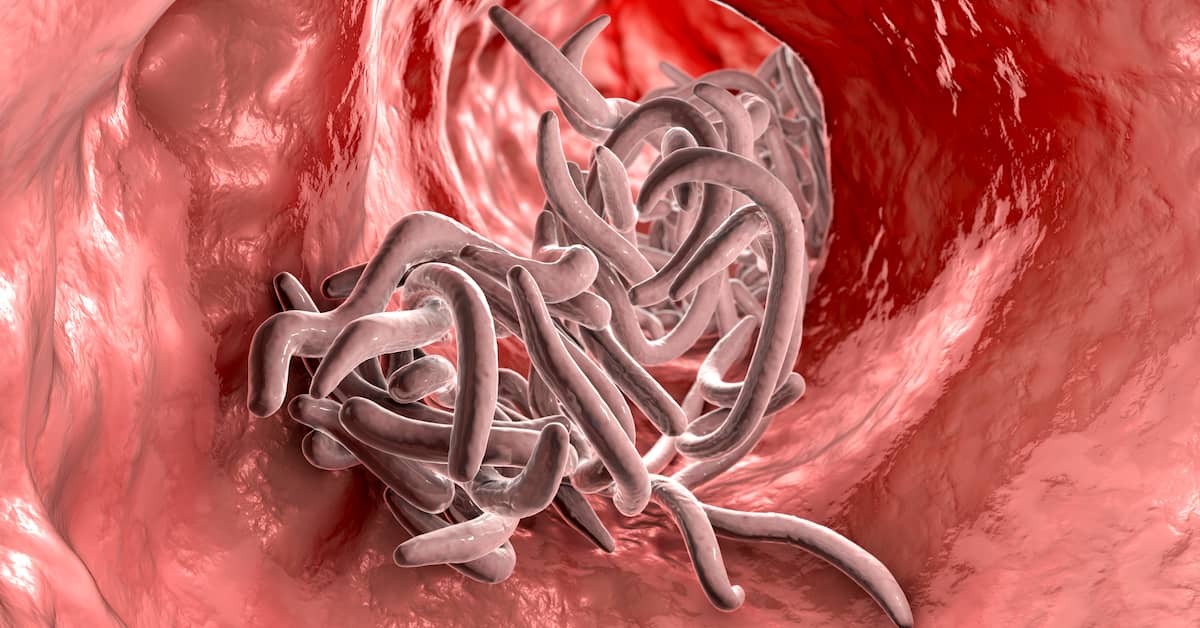
Recently they experimented with poop, transplanting fecal matter into mice — which they found lengthened their life by 15 percent.
Now, they've turned their attention to another unappealing idea, parasitic worms. What they’re finding could unlock new treatments that turn back time for the human body.
If you think parasitic worms are an odd choice for anti-aging researchers, consider that in developing countries, worms and parasites - also known as helminths – have been used for centuries to offer protection against disease.
Today, in those countries they’re used against rheumatoid arthritis, multiple sclerosis, Parkinson’s disease, infantile atopic eczema, allergies and type-2 diabetes. While the science behind these treatments might not be up to our gold standard here in the United States, people who use them swear by them.
Now, researchers are taking a closer look to see if these parasitic worms can solve a root cause of human aging: inflammation.
Age-Related Inflammation or “Inflammaging”
Research in recent years has pointed to the age-related increase of systemic low-grade inflammation as a reason for many diseases, from heart disease and dementia, to osteoporosis and age-related macular degeneration. In fact, this systemic inflammation has even been given its own name - inflammaging.One cause of inflammaging, anti-aging researchers believe, is an imbalance in the composition of microbes in the gut in which beneficial species that used to help modulate the immune system have been lost.
This is called the hygiene hypothesis or 'old friends' hypothesis.
Parasitic Worms—My ‘Old Friends’
Proponents of this theory argue that our immune systems evolved in a dirtier environment - free from hand sanitizer, and for that matter soap and bathing - and included the presence of parasitic worms like flukes, tapeworms and nematodes.These old friends have vanished in our ultra-clean modern societies and some anti-aging researchers believe their disappearance has led to a rise in allergies and autoimmune inflammatory disorders.
Researchers from the University College London (UCL) found human studies, as well as many rodent studies, to offer support for the old friends hypothesis.
But could maintaining half a dozen hookworms in your bowel actually help counteract inflammaging, diseases of aging, and even slow the aging process itself?
The UCL scientists reviewed the literature to see whether parasitic worms could really act as an anti-inflammaging therapy, and they were encouraged by a mouse study published just last year.
Lengthened Life By 12 Percent
In a pioneering study, instead of using helminths directly (thankfully!), a research group from the University of Glasgow in Scotland, tested a product called ES-62 that's secreted by a nematode.The group had previously shown the molecule could protect mice against inflammatory conditions like allergic asthma and arthritis. This time, mice were administered ES-62 each week and fed a high calorie diet throughout their lives in order to accelerate the aging process.
The researchers found ES-62 promoted late-life well-being and substantially extended the life of obese male mice by 12 percent on average.
The Scottish researchers also reported that the health-promoting effects of ES-62 came about not only through its anti-inflammatory actions but by offering protection against adipose (fat) and lowering incidence of age-related liver fibrosis (scar tissue).
ES-62 also prevented the age-related decline in gut barrier integrity seen in high calorie diets. Permeability of the gut lining can contribute to inflammaging by allowing foreign substances to enter the bloodstream, activating an immune response.
I’m relieved to learn it’s an extract from hookworms rather than the entire living organism that produced these results, because hookworms are extremely nasty parasites that were once the scourge of the American South. The results were tragic. The eradication of hookworms was a boon to mankind.
Helminth Therapy Could be Developed for Humans
As we’ve noted before in this newsletter, adipose tissue—often found in belly fat— is a major source of inflammaging because it's rich in immune and senescent cells (malfunctioning or overactive cells). Together these cells secrete a destructive cocktail of pro-inflammatory molecules which move throughout the body causing all sorts of damage.The Scottish team was hopeful that ES-62-based approaches could be developed to improve human health during aging and increase human lifespan. The UCL team agreed.
"Available evidence suggests that restorative helminth therapies are effective against not only allergic and autoimmune inflammatory disorders, but also age-associated inflammation in later life, at least to some extent,” wrote the UCL team in their review, which was published in the journal eLife in February.
"Should this be confirmed, helminth therapy could provide protection against the wide spectrum of age-related diseases promoted by inflammaging."
We’ve reported before on the growing interest in parasites and the serious problems raised by our overly sterile modern way of life. But the story I related above about hookworms points up the problems with indiscriminately “going dirty” and becoming too relaxed about sanitation.
As we go forward we’ll have to learn to strike a healthy balance between being so many little “nude” lab mice with no immune system at all and being dirty cavemen with chronic worm infestations. These are early days in this new science and we need to learn a lot more.
